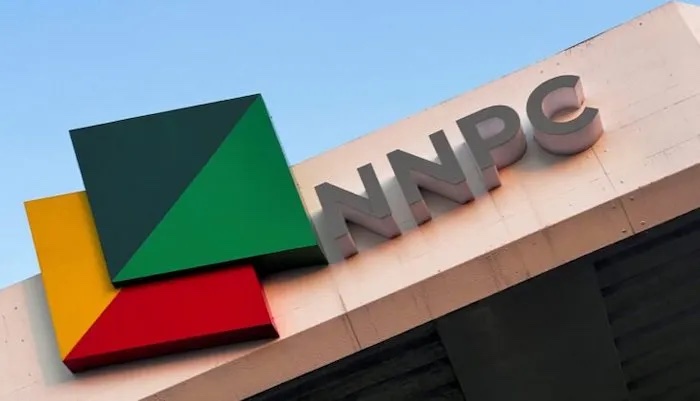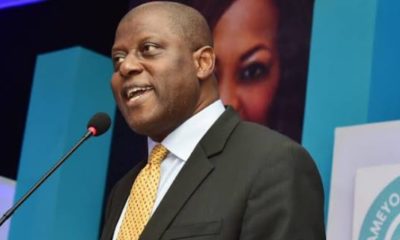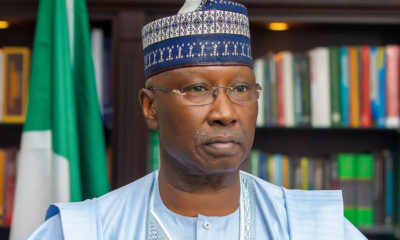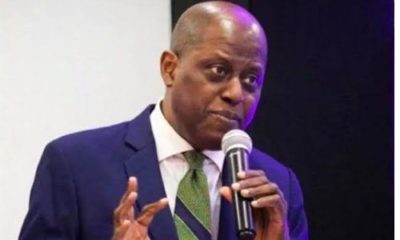Business
CBN Takes eNaira Campaign To FUTA
The Central Bank of Nigeria (CBN) has its campaign for partnership on the eNiara to the Federal University of Technology, Akure, (FUTA), Ondo State.
The bankers bank, on Monday, urged the institution to adopt the newly introduced digital currency known as eNaira, for financial transactions for the university community.
Acting Controller, CBN’s Akure Branch, Samuel Giwa, who led a team of the apex bank’s officials on the visit to the FUTA harped on the need for Nigerians to embrace the new digital currency, going by lots of benefits attached to it.
According to Giwa, the eNaira has the potential to revolutionise the way “we transact and conduct business.”
On why the FUTA should adopt the eNaira system, Giwa explained that it was convenient, safe, efficient, and transparent.
In his words, “This digital currency, individuals can swiftly and easily make payments without relying on physical cash or traditional payment cards.
“The eNaira streamlines the payment process, allowing for seamless transactions in various scenarios.
“The eNaira operates on robust blockchain technology, ensuring a high level of security. This advanced technology makes it incredibly challenging to counterfeit or compromise the currency, providing peace of mind to both users and businesses.
“By adopting the eNaira, we bolster the integrity and trustworthiness of our financial ecosystem.
“The eNaira plays a vital role in promoting financial inclusion, particularly for individuals without access to traditional banking services. This digital currency opens doors for those who may have been previously excluded from the formal financial system, granting them the ability to engage in digital transactions and experience the benefits of financial empowerment.
“Embracing the eNaira can significantly enhance the efficiency of our financial operations. The transparency and traceability of transactions facilitated by the digital currency allow for streamlined processes, reducing administrative burdens and improving overall operational efficiency.
“The eNaira serves as a catalyst for economic growth, as evidenced by other countries’ successful adoption of central bank digital currencies.
“China’s digital yuan and the Bahamas’ Sand Dollar have demonstrated how CBDCs can boost the efficiency of financial systems and stimulate economic development.
“By embracing the eNaira, we position ourselves at the forefront of progress, fostering a thriving economic environment.”
Specifically, the acting controller urged the university to adopt the eNaira for the collection of fees, levies, and revenues on the campus of the institution.
On her part, Vice Chancellor, FUTA, Prof Adenike Oladiji lauded the apex bank for the digital currency initiative and counselled that the youths be carried along.
Represented by the Deputy Vice-Chancellor Academics, Prof. Taiwo Amos, the VC said the FUTA students were vibrant and would be ready to accept the new system.
“In FUTA here, we have vibrant crops of students, they are trailblazers. Two of them would soon be going to the United States for five weeks of training. On the issue of adopting the system (eNaira) to collect fees on the campus, we can’t decide that here, when we get to the bridge we cross,” the VC stated.
Business
Marketers In Anguish, As Dangote, NNPC Ltd War Drag Price To N880/litre

The pull of market forces which moved the hands of the Nigerian National Petroleum Company Limited (NNPC Ltd) to reduce the price of Premium Motor Spirit (petrol) to N880 per litre in Lagos and N935 in Abuja appears to be a source of torture to independent markets.
Biztellers reports that the latest price review on Easter Monday saw NNPC retail outlets in Lagos drop from N925 to N880, while those in Abuja adjusted from N950 to N935.
The NNPC Ltd’s price reduction came barely a week after the Dangote Refinery lowered its ex-depot price from N865 to N835 per litre.
ALSO READ: BREAKING: Again, Dangote Cuts Petrol Price To N835 per Litre
In addition, the $20bn refinery also directed its partners like MRS, Heyden, and Ardova to sell a litre of petrol at the rate of N890 instead of N920 in Lagos, N900 in the South West, N910 in the South-South, and N920 in the North East.
Consumers can smile because with the reaction, the NNPC Ltd’s new price in Lagos is N10 lower than what the Dangote Refinery is selling at, which might lead to another reaction, as the price war between the two companies.
Though some NNPC Ltd’s retail outlets were observed selling at the old rate in Lagos, it was gathered that they were given the liberty to exhaust old stock before adjusting to the new prices.
Market sources are of the view that the current price war was ignited by the Federal Government’s implementation of the Naira-for-crude policy.
Business
Gold Prices Hit Historic $3,500 Amid Trump Tariffs, Fed Tensions
Gold soared to a record high of $3,500 an ounce on Tuesday, as mounting fears over a potential U.S. recession and escalating tensions between President Donald Trump and the Federal Reserve drove investors toward the traditional safe-haven asset.
The precious metal briefly touched an all-time high of $3,500.10 an ounce before retreating slightly to trade at $3,467.87.
READ ALSO: JUST IN: Vatican Discloses Cause Of Pope Francis’ Death
The rally marks the latest in a string of record-breaking gains for gold, fueled by a weakening U.S. dollar, sharp declines across global stock markets, and growing concerns over the health of the world economy.
Market sentiment took another hit this week after President Trump ramped up his trade war with China, slapping fresh tariffs on the world’s second-largest economy and intensifying fears of prolonged economic disruption.
Gold has surged more than 30 percent since the start of the year as investors seek refuge from mounting market volatility.
“The rally reflects ongoing recession fears in the U.S. economy and heightened political tensions, especially as President Donald Trump continues to attack Federal Reserve Chair Jerome Powell,” said Rania Gule, senior market analyst at trading group XS.com.
Concerns about the Fed’s independence were further stoked Monday, when Trump publicly lashed out at Powell on social media, branding him a “major loser” for not cutting interest rates — a move the president has repeatedly demanded.
The sharp criticism follows Trump’s recent suggestion that he might attempt to remove Powell from his post.
Business
World Economic Forum Founder Klaus Schwab Steps Down From Board
Klaus Schwab, the founder of the World Economic Forum (WEF), announced his resignation from the board on Monday, marking a significant moment in the organization’s history.
Schwab, who has been at the helm of the WEF for over five decades, confirmed he was stepping down from his position as Chair and leaving the Board of Trustees with immediate effect.
“I have decided to step down from the position of Chair and as a member of the Board of Trustees, with immediate effect,” Schwab said, noting that the decision comes as he approaches his 88th year.
READ MORE: NNPC Ltd Opens Retail Outlet In Bauchi
His resignation follows his stepping down as executive chairman in 2024, when former Norwegian foreign minister Borge Brende took over the day-to-day operations.
In response, WEF appointed Vice Chairman Peter Brabeck-Letmathe as interim chairman while a search committee was formed to find a permanent successor.
The WEF board lauded Schwab’s immense contributions, acknowledging his “outstanding achievements” over his 55-year leadership tenure.
“At a time when the world is undergoing rapid transformation, the need for inclusive dialogue to navigate complexity and shape the future has never been more critical,” the WEF stated.
“Building on its trusted role, the Forum will continue to bring together leaders from all sectors and regions to exchange insights and foster collaboration.”
Schwab, originally from Ravensburg, Germany, founded the precursor to the WEF, the European Management Forum, in 1971.
The first meeting drew fewer than 500 participants, but over the years, Schwab expanded the gathering into a prestigious platform that now attracts thousands of influential figures.
The Davos summit has become synonymous with global power brokers, offering opportunities for high-level networking, discussion, and collaboration on issues affecting the world.
Under Schwab’s leadership, the WEF grew to include regional meetings and established centers dedicated to pressing global topics such as cybersecurity, climate change, and financial systems.
The organization continues to uphold its mission of “improving the state of the world” by fostering dialogue and cooperation.
However, the WEF and Schwab have not been without their critics. Many argue that the forum has become a venue for corporate elites to exert influence over governments, with the term “Davos Man” often used to describe the affluent attendees.
Schwab has also faced the ire of conspiracy theorists, particularly following his promotion of the “Great Reset” following the COVID-19 pandemic.
These theorists have spread misinformation, alleging that Schwab and the WEF are part of a global elite aiming to control the world, with even Elon Musk weighing in on social media, claiming Schwab “wants to be emperor of Earth.”






















